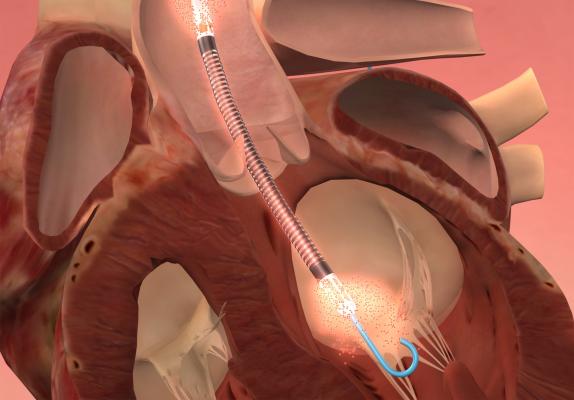
April 5, 2019 — Three years ago this week, Abiomed's Impella heart pump received U.S. Food and Drug Administration (FDA) premarket approval (PMA) for acute myocardial infarction (AMI) cardiogenic shock. At the time of Impella’s FDA PMA approval, the cardiogenic shock survival rate to explant in the Impella Quality Assurance (IQ) Database was 51 percent in the United States1. Today, Impella heart pumps, combined with the adoption of best practices that include the use of Impella pre-percutaneous coronary intervention (PCI), have contributed to a significant increase in cardiogenic shock survival and native heart recovery. New data from the IQ Database on nearly 5,000 patients treated between April 2018 and March 2019 show an increase in survival from 51 percent to 67 percent2, a relative increase of 34 percent in survival.
Since FDA PMA approval, Abiomed has collected data on nearly 100 percent of U.S. Impella patients in the observational IQ Database. This clinical data, combined with the FDA post-approval studies embedded in Abiomed’s prospective cVAD Study, helped identify and validate best practices for Impella use associated with improved survival and native heart recovery. These best practices — including use of Impella pre-PCI, reduction of inotropes, early identification of shock and hemodynamic monitoring with pulmonary artery catheters — have now been validated in multiple publications:
-
Journal of Interventional Cardiology, 2014: Placement of Impella pre-PCI is associated with more complete revascularization and improved survival to discharge in the setting of AMI cardiogenic shock (65 percent with Impella placed pre-PCI vs. 41 percent post-PCI, p=0.023);
-
American Journal of Cardiology, 2017: Initiation of Impella before PCI and prior to initiation of inotropes or vasopressors is independently associated with improved survival. Survival to discharge was 68 percent, 46 percent, 35 percent, 35 percent and 26 percent for patients requiring 0, 1, 2, 3 and ≥4 inotropes before mechanical circulatory support, respectively (p <0.001), in an analysis of 281 AMI cardiogenic shock patients.
-
Journal of Interventional Cardiology, 2017: Demonstrates a 48 percent survival at 30 days when Impella is implanted pre-PCI, compared to a 13 percent survival when Impella is implanted post-PCI for left main in cardiogenic shock (p=0.004).
-
American Heart Journal, 2018: Analysis of 15,259 U.S. patients in the IQ Database demonstrated an improvement in survival to explant from 52 percent to 59 percent when Impella was placed pre-PCI (p=0.001).
-
National Cardiogenic Shock Initiative Study Late Breaking Clinical Science, TCT 2018: Data from the first 104 patients utilizing best practices in the National Cardiogenic Shock Initiative (NCSI) Study found 77 percent survival to discharge with 99 percent native heart recovery.
-
Circulation, 2018: Analysis reinforces best practices of reduced use of inotropes and placement of Impella pre-PCI leads to improved survival rates. Survival benefit of Impella pre-PCI revealed trend vs “matched” IABP-Shock: 57.3 percent vs. 46.7 percent (p=0.18). There was significant survival to discharge benefit with Impella in patients who did not receive inotropes (56.6 percent vs. 29.4 percent p<0.01). A subset of patients from this paper was presented at American College of Cardiology (ACC) 2019 Scientific Sessions when Andreas Schäfer, M.D., presented an abstract that showed improved survival to discharge when Impella is placed pre-PCI of 71 percent vs. 49 percent post-PCI (p= 0.0021).
-
Journal of the American College of Cardiology, 2018: Rab, et al., summarizes data from IQ Database, cVAD Study and NCSI and concluded that best practices are associated with improved survival in AMI cardiogenic shock.
The most recent results that further validate best practices published online this week in the Journal of the American College of Cardiology. After Inova Heart and Vascular Institute instituted a best practice protocol that includes early use of percutaneous mechanical circulatory support, AMI cardiogenic shock survival at 30 days rose from 44 percent to 82 percent (p=0.0001).
“The totality of the data on Impella use for cardiogenic shock demonstrates that coordinated care with a multidisciplinary team-based approach, a standardized protocol and the best available tools can lead to a remarkable increase in survival,” said William O’Neill, M.D., medical director of the Center for Structural Heart Disease at Henry Ford Hospital in Detroit. “This gives us hope for making real improvements to patient outcomes in this patient population that has historically been difficult to treat.”
Watch the VIDEO: Overview of the National Cardiogenic Shock Initiative, an interview with O’Neill
For more information: www.abiomed.com
Related Impella Content
VIDEO: Cardiogenic Shock Supported With Impella Shows Good Outcomes
VIDEO: Hemodynamic Support Protocols at Henry Ford Hospital
Detroit Cardiogenic Shock Initiative Goes National at TCT 2017
References
2. Median survival of AMICS patients treated at 763 sites supporting >4 AMICS patients with PCI. 4,891 patients total. Data on file. Abiomed Impella Quality (IQ) Database, AMI/CGS, Apr 1, 2018 – Mar 28, 2019. Danvers, MA: Abiomed.


 January 05, 2026
January 05, 2026 









